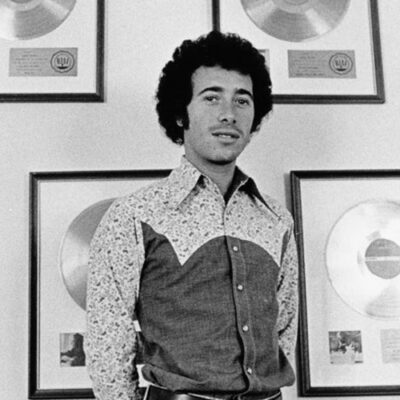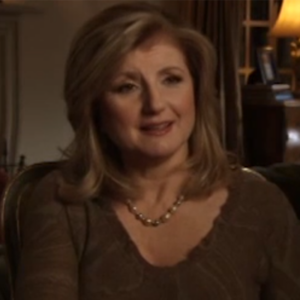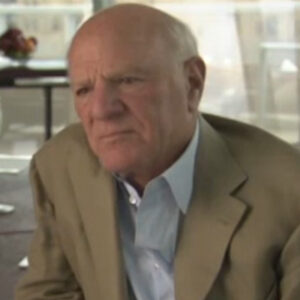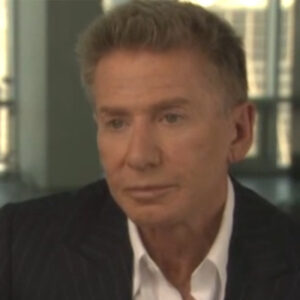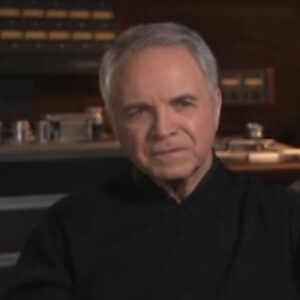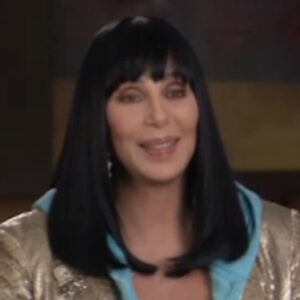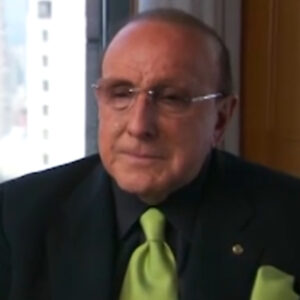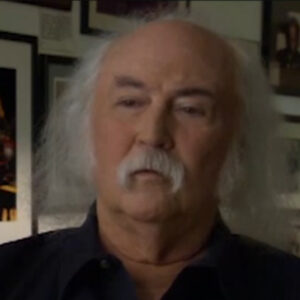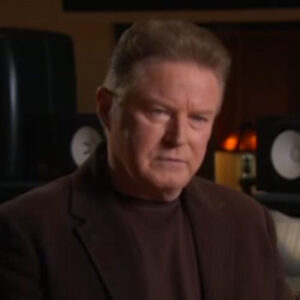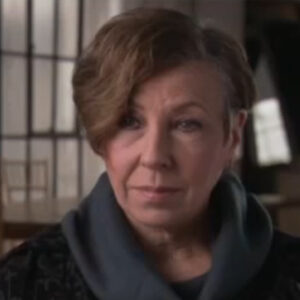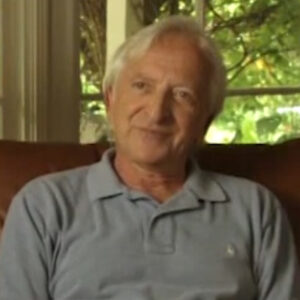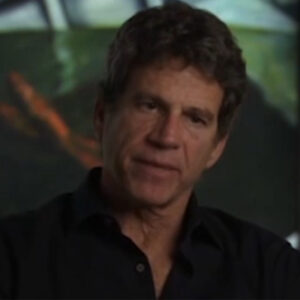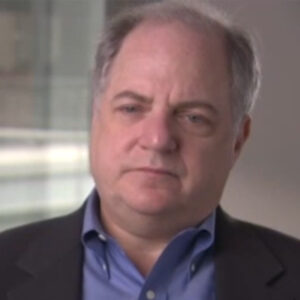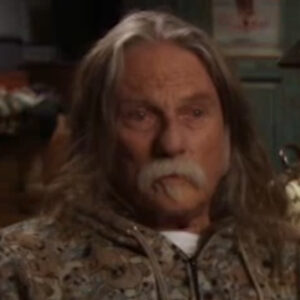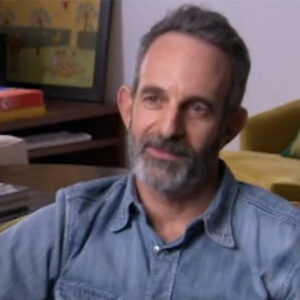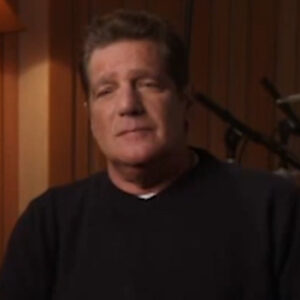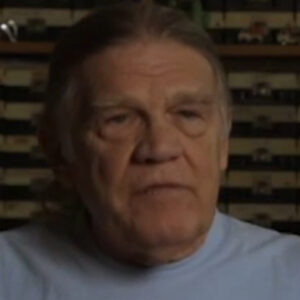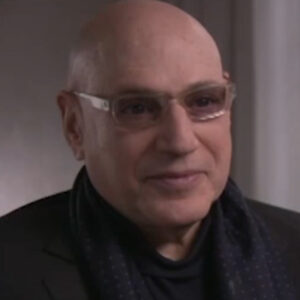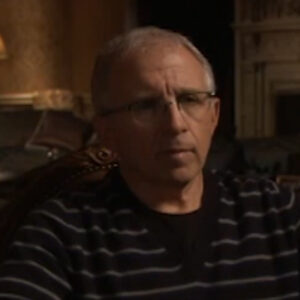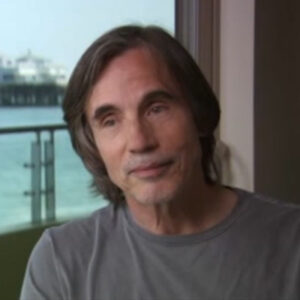Speaker So tell tell us the background on Risky Business, how you and David connected, how this group got together. That whole background.
Speaker Originally, I wrote Risky Business under either two picture deal at Warner Brothers at the time.
Speaker And I developed it there. And then I brought in two producers, Jon Avnet and Steve Tisch, and finished the script at Mourner’s, and they put it into turnaround. They didn’t want to make the movie. So we had it in turnaround and we shopped at all over Hollywood. And we are pretty well-connected at the time. And we didn’t think it was gonna be a problem setting that up. But it was. And we couldn’t get any buyers for the script. We couldn’t get anyone interested in it. So eventually we were kind of running on fumes at the time. And David had just, I think, started gearing up his film company.
Speaker And an attorney we knew got the script to Eric Eisner, who is a friend of his. And Eric gave it to David and David read it on a plane coming back from New York and basically committed to making the movie.
Speaker Can you in a couple of sentences, I mean, it just say we’ll do that. What risky business is and why is that? Why you said it is difficult. So what’s it what’s the sum up the plot and why is it difficult to sell?
Speaker Well, risky to me was all about the Reagan era and everyone wanting to be a little capitalist. That was the theme of risky and what a myth that was in that things are a lot harder than they were made out to be at the time. It was a really romanticized what’s going on in that culture was a romanticized view of what capitalism was, but it was really tough for a lot of people. So that was kind of the theme for me.
Speaker Ironic for bringing it to a guy like David, but OK, at that rest. The other part of your question was what?
Speaker Why do you think it was so difficult to sell this movie?
Speaker Oh, why was it difficult to sell the movie? I think that’s that’s a tough question. I think it was difficult for probably a couple reasons. One, there was a mix of tone in it that no one understood. There was a mix of humor, darkness and sexuality, which was not like teenage films before. You know, I wanted to do a film that was unlike any other teenage film that was made tonally. I want to do a film that I would have wanted to see in high school. So it was a little bit darker. And this sexuality was not like, um, like porkies or anything like that. Nor was the humor. And I don’t think anyone understood what that was. The other thing was I had never directed before. I was a first time director, so there was a real leap of faith there. But it was an expensive film, a really expensive film to make. So we were baffled as to why other studios weren’t jumping on the project at the time.
Speaker So where do you think David responded so quickly to the material?
Speaker I he responded to the material and then we had dinner together. So, you know, I’m hoping that he made a leap of faith on me, and I think that’s what he did. I think that’s what David does. And I think that’s what sets them apart clearly from corporations basically who are trying to take a safer approach all the time. And David will go with his instincts, which I think is really important.
Speaker I think you’re actually right. So banks people.
Speaker Yeah. But you have to ask yourself, how does he. How does David believe in people or what? How does that come to be in the course of a dinner or reading one script or something like that? I mean, that’s that is the leap that David’s able to make, which I think is astounding. And it brings material to bear that otherwise may never see the light of day.
Speaker How do you how do you feel about working here? I mean, getting pictures was pretty new.
Speaker And he was just we were just delighted to be moving forward. And also, you know, David brings a lot to the table for sports. He said he’s not a corporation, but he’s got the force of a corporation. But you’re dealing with one guy and. You know, you can go to him and get really straight answers from him, and he’s not protecting his turf for not dealing with politics or anything like that. You’re dealing with one man. The other thing is David’s always made himself accessible, which was a wonderful thing. If you needed to talk to him, he’d be on the phone in minutes with you always. That was during the making a film and after the making of the film, too, for any reason. So he was always there. And then I’d say the third thing is and this is probably even the strongest thing he I think he understood the artistic process because he’d been through it so many times with musicians and not so much with film makers, but certainly in the music world. And he knew the value of time. So, you know, the process of making these things, this is like groping toward excellence. You’re not always sure you’re in the dark a lot of the time and you’re testing and you’re trying things. And some things don’t work. And, you know, often, you know, you know that they don’t work. So there’s some rethinking. There’s some reconstruction. There’s refining that goes on. And if you ever went to David and said, you know, we didn’t get this scene, we’re going to need a day or two, we’re going to need a little more some resources, run whatever you need. I can tell you exactly what he would say every time he would say make it as good as it can be to make it. Now, it was always within reason. You know, he couldn’t be totally extravagant. What you were doing. But if it was within reason, he would say make it as good as it can be and take the time to do that. And that was true in casting. That was true in shooting. It was true in editing. It was true all the way through the process. And I think he he really did encourage excellence and in that way.
Speaker How did you have to get involved in the casting process? David? The one thing that he really wanted to be involved with, I don’t remember David being involved.
Speaker We almost until the end. Yeah.
Speaker Because I think in terms of casting, I don’t remember David involving himself at all until the very end. And what we did, we cast for a long time. We were really looking for a. We read hundreds of actors in various cities and eventually I screen tested two actors and two actresses. And I said, David, we’ve spent a lot of time. This is where we’re at. And he looked at it. I said, keep going. And we kept going. I couldn’t disagree with him at the time, but I thought his judgment was wise there. And we did keep going. And then we took the next step. And then we put together Tom and Rebecca and we screen tested them. And he was good with them. He was good with both of them.
Speaker So what happened? So during the artistic process of the creation of the film production of the film. Was he fairly hands off?
Speaker He was almost totally hands off again until the very end.
Speaker So what happened?
Speaker First screen film for first screen, the film for the you know what I have. I don’t have a memory of screening the film from initially.
Speaker I don’t even know if I was there when he screened. I remember the first public screening with David, but I don’t remember the first time that he saw it. If I was with him, maybe I wasn’t. I don’t know.
Speaker First public screening even after it opened.
Speaker No, no, no, no. This was the very first screening with an audience, which was some, you know, people we knew, some some people off the streets. You know, it was there was a screening at the Writers Guild Theater at the time.
Speaker Just describe to me, I mean, you and David had some conflict over the end. We did. Yes. Did you just tell that story?
Speaker Well, I think the conflict over the ending was, again, a tonal thing. And I wanted to go to a more bittersweet place and he wanted to go to what I would call a more conventional place, which had an upbeat ending.
Speaker And how did I want it to end? It’s actually in the end. But OK, but you need to tell me. I need to tell you. For anyone who wants to give a gift to the 25th anniversary DVD, it’s it’s in the my ending was a bittersweet ending.
Speaker It ended with Joel comforting. Lanta and realizing what a tough road she had in front of her and and how vulnerable she was and really his arms around her and she’s in his lap. And then he has blind. That’s ironic.
Speaker Which is it was always in the script. It was. My name is Joel Goodson. Ideal on human fulfillment. I made a thousand dollars and one night isn’t life grand.
Speaker But then we see this girl and we know what that’s about. It was it was too much of a downer for David, I guess, or two. Bittersweet.
Speaker So there is another aspect, too, and that was my original cut. Joel did not get into Princeton and that was in contention.
Speaker David said he has to have that success. Now, I know how much success is important, David, but he had to have it in the film, too. And I resisted that. And I resisted the last beat of losing the scene that I had with with with that scene between Joan.
Speaker So we kind of went head to head on that and had it resolved the way it always resolves.
Speaker David wins. I went as far as I could go test two endings and we did test two and we went to San Diego. Obviously, the happy ending is going to test a little higher. I don’t care about that. I think the film would have been a smarter film and would have played just as well in the end. But it’s always going to test higher if you give give people a lift. There’s no question about it. And I remember sitting next to David at the San Diego San Diego screening, and we just did the new version. We were testing it back to back it. And when the audience applauded, when Jode got into Princeton. Yeah. I could clap, just arm down on. I jumped out of my seat. And he said, yes. So but I’ll tell you, in conclusion, looking back with with hindsight and more wisdom and more mature, we were both right and we were both wrong.
Speaker And actually, the answer to the best the best approach to that ending would have been a little what we are both saying. And that’s what I tried to. That’s what I tried to explain in the 25th anniversary DVD and show it.
Speaker There is David, you know, David is known and he got that nobody.
Speaker What do you have to say or is it just not important to discuss?
Speaker Well, he was really my movie. No one wanted to rattle any cages and bring back those memories or anything like that.
Speaker Well, what was it like to be on the receiving end of pressure from loud?
Speaker It was very loud. Oh, receiving pressure from David. Yes, it’s very loud. You know, I remember getting a call from him and he was really I had a what year was this is with was I think I had an infant at the time and the baby was screaming and one side and David was screaming in my ear on the other side, you know, barely hear myself think. And.
Speaker And he said, what’s going on over there? I said, she just saw your ending. And he thought that was amusing. Yeah, I know it’s tough.
Speaker You don’t get because it’s really funny story. Didn’t tell as funny as it could be. Just say, so what’s going on? And it wasn’t the same cheat she she just saw the ending. A risky business or was it your ending?
Speaker I said I said I said, David, that the baby, the screaming baby just saw your ending to risky business. And that’s what was make the baby cry.
Speaker Did you laugh? He did. And then he kept screaming.
Speaker I mean, I can’t believe that I. I had the temerity to go up against David as a first time director like that, but it was instructive.
Speaker How did it affect your relationship?
Speaker I think it was difficult for a while and but we came back together. You know, we did another film together.
Speaker I think, you know, I again, working with David on these things is so much better than working with a studio and working with a corporation.
Speaker You know, you just have to talk about what that is. You said earlier something that is interesting is that he has the force of the corporation. Tell me what you mean.
Speaker Well, from an artist’s point of view, I always felt if David and I wanted to do something or get something accomplished, we would do it. There was no way to stop what we wanted to do as long as David was on the same page as you. And you know what a godsend that is. And so many ways. One, in getting the resources to do what you have to do. But, you know, in marketing campaigns and ad campaigns and things like that. I know, and risky. We were not happy with the campaign that the studio came up with and we took it outside the studio. We and we, you know, engaged our own advertising house and did it to our specs.
Speaker And that was the poster that you saw of Tom looking over the glasses. And before that, they did a really studio came up with an idea that was very cartoony like. But again, they were thinking Porky’s. And so it was in that mode in which the film never was.
Speaker And David had enough power to be able to withstand the studio. I mean, how did how did he manifest this power and how does David manifest power?
Speaker Well, in this instance, he was fairly new to litigiousness to so but he wasn’t new to Hollywood. So.
Speaker I mean, he also had the temerity to go out with me and say, you both had you were both of first time away in this people first time director. This was your second movie, OK? The first one had a very embarrassing situation for him, for his company one.
Speaker David was also an executive at Warners prior to that. So, you know, David was a force in Hollywood. And I think, you know, it transcended the music business. But, you know, how is someone forced like that? I think by nature of your personality, your will. You know, I I don’t think money was an issue with David, but maybe some of it’s illusion, too. I mean, who knows? But he gets the job done. And I had a lot of confidence that he could.
Speaker He oh, I’m so unshakable confidence in itself. Do you think he does have an option? I mean, a high degree of self-confidence.
Speaker I don’t mean that is a loaded question. I don’t.
Speaker And it always amazes me, given where he came from, that he walked into every situation completely confident he was going to make success out of it.
Speaker Yeah, yeah, I do think David believes in himself, although I’ve seen at moments of doubt. But what can be more human to mean? But ultimately, yeah, I think again, and for him to take a chance on someone like me, you have to believe you have to believe in yourself.
Speaker Otherwise, why would you do it?
Speaker So would you say that? Because I think what he was an executive at one, it wasn’t particularly positive experience. What he did work well in that environment and he’d be the first to say. Right. And because it was too much a corporation, it was too much by committee. He didn’t play this role as well. And he needed to be out on his own. That was that was actually great failure. Do you know about that period?
Speaker I do not know. I didn’t meet him till after that.
Speaker I don’t know what year he left there, but I probably met David in eighty one, which was right when he put his company together or shortly after. It’s probably never had the famous 22nd story.
Speaker No. He was as an executive who screamed. I think it was Outlaw Josey Wells. Yeah.
Speaker And it’s hard to quit. This is your best work ever. This is this is really great.
Speaker It’s just I think it’s 15 minutes too long and quit to sort of look at it. Thank you very much. Why don’t you send me a note about that and you can send it to me over at Paramount. And he said, Why Paramount?
Speaker Because that’s what I want to make my next day. It was like, oh, it’s perfect. You know, you’ve got to realize that what he was able to do in the music business was did not work within the studio system.
Speaker So I guess he was better off on his own. Do you think he was a good producer of movies?
Speaker Well, when you say producer, you know, he’s he’s not a Hands-On producer. It was his company that made the film. Good instinct for material so good. Well, David’s interesting, I think, and there’s a paradox with David because I think David’s tastes. They’re smart, but they’re they’re more mainstream. I think David’s tastes, even in music and film, are our main mainstream tastes. But he gravitates toward artists that have a really singular personal vision and gets behind now. So, you know, I can give you a couple of examples. You look at Laura Nyro. You look at her two albums, New York Tend to Bury and Christmas and the Beads of Sweat. Hardly mainstream albums. No amazing works done with David. I don’t know what David’s influence was there or what not. But I’ve got to assume, you know, he was encouraging her to get to that that place. And again, a very special, singular vision on the film side. Albert Brooks, I mean, Albert Brooks is a very unique artist, hardly mainstream. And David, you know, backed him and made a number of films with him. So, yeah, it’s it’s really interesting. And in terms of the dichotomy there.
Speaker So it’s a very insightful statement, and I think that’s where a lot of his strength as a person behind the curtain comes from is recognizing that singular talent and believing in those people wanting to make it happen.
Speaker Right. And encouraging that work. He does encourage the work. You know, I once had a discussion with Dave and I was getting all these scripts from the studios that this is terrible. What what’s going on? Why is the writing so weak? And he said it’s not a good writing is not been encouraged. I thought that was a really why statement. Because it’s it’s not you know, they were going toward the lowest common denominator or what’s been done before generic material. And I think David encourages excellence and he does push toward a does push the artist toward excellence. And I think that’s a really great thing about what he’s done.
Speaker Yeah. I mean, you just have just have kind of. He could taste all around. And I say that with some some patting on the back. But that’s actually how I got to know David, is that he called me. You can be cynical about that. You say they’re rather big. He actually called to tell me he’d see my Leonard Bernstein document. And he really, really thought this is the greatest documentary ever seen. And it really is. But it takes a certain kind of.
Speaker Something more than just good taste to have on two. You really got why that was so great.
Speaker It wasn’t just because it was a good story. I mean, it had a lot of layers and complexity and stuff in it, apparently just everybody else, if they haven’t seen it.
Speaker That impressed me, not just because it was film I neck, but that he got why that was different than most portrait documentaries that I made. That’s really very good instincts.
Speaker He does have very good instincts. And the other side of this is, you know, success is really important to David clearly. But sometimes when he’s working with these artists, it can’t be about success because there’s. Because I again, he’s not working in the mainstream of the culture here. And there may be limits to these projects. I like that. The other example would be the second film that I did with David, which was Men Don’t Live with Jessica Lange and John Cusack, which probably had a limited audience. And I think David probably realized that going in. You know, I’m not sure he had a huge, huge upside. And yet he got behind that and he was very gracious. And, you know, in during the release of that film, when it did well, critically, it made a lot of top 10 list. But in terms of box office, it was a disappointment. And he was very gracious about that. But he’s still willing to, you know, get behind it and then dedicate himself to taking it as far as it could go.
Speaker What do you know about some of the other movies that he got involved with? Probably not too much with The Vampire, which is also a Tom Cruise and a lot of fun. That’s not a mainstream movie.
Speaker That’s right.
Speaker That’s a little esoteric waves of terror to us.
Speaker I can’t remember any other.
Speaker Well, be Beetlejuice was as big. Oh, that was a big hit.
Speaker That was just absolutely wonderful.
Speaker But it took a certain vision also to see that we did not get that.
Speaker Clearly. Yeah. And then and if you look at the films that he made, there’s not a generic film in the bunch.
Speaker Not one.
Speaker So I finish my prepared text because the one that I’m curious about is, you know you know, David, you’ve known him a long time.
Speaker He’s still friends.
Speaker We are friends. I don’t see him as much as I used to see him. But I mean, there were times where I’d be driving by his house and I’d call him and say, I’m driving by your house. If you want to say hi, said, come on in. You know, and we’d have dinner together or something like that. He was he was that open. So, yeah, I know. I just feel fortunate.
Speaker Even with the conflicts that we’ve had, I feel very fortunate that he’s been a part of my life because it’s it’s really enriched things. And I’m lucky for your observations.
Speaker You’re a writer. You read people. How do you read David drives him. What does he care about besides the things we just talked about? What’s that inner soul about? Do you think?
Speaker But makes David tick.
Speaker That’s a very difficult question. It is a very complex character.
Speaker You know.
Speaker And I don’t know now, you know, time has passed. When I was dealing with David, he was in his late 30s and early 40s. And at that time, you know, in conversations with him, the terms, success and money would come. Those two words would come up quite a bit in conversations with him, often in the context like, I don’t need money here. You know, I I give all this away and all that. And, you know, he’s been incredibly generous over the years with it. I think in those days he was driven by success.
Speaker But more than that, you know, risky was the perfect project for him, though.
Speaker Curiously enough, because not only was he proven right, but everyone else in town was proven wrong. And I think that’s a lot of the fun for David. I think he got a real, real kick out of that.
Speaker It’s interesting.
Speaker In the success that it really is more about being right than just the money is.
Speaker Well, money becomes not about money as we know it. At a certain point, it becomes a scorecard. And and you can then it becomes about winning or losing vcp other people or not. It’s just no more than a scorecard. It’s like sport at that point, you know.
Speaker And you probably know this, that word 81 said about, you know, mobilize.
Speaker David, somebody working for you, not against you. What? He’s really not on your side.
Speaker Well, I experienced that when we had a conflict over the ending. So the answer to that is you lose.
Speaker Do you think he’s a. Can he be an evil force?
Speaker Oh, gosh.
Speaker And then again, I don’t mean this in a loaded way, but there are you know, there is a certain hesitancy.
Speaker People have to talking about the the more ruthless side of David. And there is a side I think I think he’s mellow. I think he faced that in some way. I think he tried to make some revisit some of that. But, you know, I I gather from some of the interviews I’ve had that that David could be could be a real force to be reckoned with. He didn’t want to be on Dave’s bedside.
Speaker Well, my experience with David was that he was never he was no arbitrary about anything. I felt he was coming at it from a certain point of view. And it might have been a different point of view. And it was actually that was only about one issue.
Speaker That was the only time we were ever in conflict, really about anything. But it was just conflicting points of view about something very specific. So I don’t think there was a personal agenda of any kind or anything like that.
Speaker Just tell us what you know, what kind of reception it had that went on to be a huge box office success.
Speaker And it’s become a kind of iconic film of its era.
Speaker All right. Well, what risky was when we screened risky for the studio for Warner Brothers where it started? It wasn’t putting it into turnaround.
Speaker And then ironically, because Geffen still was with Warner Brothers, it was forced back on the studio for them to release the film they didn’t want to make in the first place that they didn’t get. So we screen it for the Warners exacts. And I knew they didn’t understand the script. They didn’t get the tone of the script when they saw the movie. Didn’t get the tone of the movie either. They still didn’t know what to do with it. So they didn’t give us a good release pattern for the first week. And then when things heated up real fast, then they had to scramble to get us theaters. But I got a call from David.
Speaker First weekend. And the first thing he said, the first thing he said was, it’s a hit. I remember he said it’s a hit, but I was still pissed off about the ending. So it was like they were releasing a film that I wasn’t really happy about. OK. So it’s a hit. So what? So I was still grumbling about that. But the film played it only opened in seven hundred seventy years. It was very moderate opening again because Warners gave most of their theaters to Kujo. I think at the time that was the competing film, but we stayed in the theaters forever. If you look at the release, the box office results, it was there playing at number two for months, which is never happens today anymore. But it was there for a week. One, two, three, four. In twelve weeks later, it was still playing there.
Speaker So it was playing at a decent level for a long period of time and still played and still plays. And they still do parodies of it all the time. Can’t get away from it.
Speaker It’s amazing how many times you see that image of somebody at the door.
Speaker You know that dance in an I was in script. You, Ron Reagan Junior did it while his dad was president on Saturday Night Live.
Speaker He did the entire dance much to the horror of his mother and father.
Speaker Tell me if you were going to see if you heard there’s going to be a film on David Geffen and you got to see it. Why do you want to see it? Why do you think his legacy is? What would you want?
Speaker A film that David Geffen Company film Geffen?
Speaker No, just David Geffen. You know, movies were really not the biggest prize of his career. Right. This is it’s a documentary about him. Let’s say you were going to go to the movie theater. You heard there’s a documentary on David Geffen.
Speaker What are you expecting in that film?
Speaker I have no idea. I would expect that he got behind an interesting artist. No idea what the content would be.
Speaker And what do you think his overall legacy is in Hollywood?
Speaker I think it’s enabling works of art that might not have existed otherwise, that would have never made it through a corporate system and might not for me, you know, risky might never have been made without David. Maybe it would have. But there’s a good chance it might not have been. And if it was, it might not have been as good as it was, because he did give me the time and the resources to do really good work. So I think that is David’s legacy, giving, you know, untested, sometimes, sometimes tested artists of personal vision, the time and the resources to do their work and really pursue excellence. Thank you. I have one more story, though. I don’t know if you can use this, but after Risky was released and it was a hit, I get a call from David and he says he’s thinking of selling his Porsche. Excuse me. I got to start again after Risky was released and it was a hit. I get a call from David and he says he’s he’s thinking of getting rid of his Porsche. Am I interested? And I figured, great. This is my Hollywood car moment because I’ve heard of other guys getting cars after a successful films.
Speaker I think Scott Rudin got a car from Paramount. I thought, this is great. It’s my car.
Speaker So I said, Yeah, David, I’m really interested. He said because it was a convertible and he was happy. It was a manual top. He’s having trouble getting the top up and down. He didn’t like it. I figured, OK, it’s not a new Hollywood carpet. Maybe it’s a used Hollywood car. This is good. I said, David, I’m really interested. He said, Great. Thirty three thousand dollars. Which is which is book. But it’s got really low. My shoe. I figure, oh, man, I guess I’m not getting my Hollywood car. So I said, let me think about it. And in those days to figure out what book was, you had to go to a newsstand to get Kelley Blue Book. You actually had to buy it because there was no Internet. So I went to the newsstand just to see what book was. And thirty three thousand was like high book. It’s never negotiate with David. And that was then. But, you know, this is not to say that he’s not a really generous guy because he’s you know, he’s David Geffen Medical Center at UCLA, the David Geffen Theater, the David Geffen Canterbury Art Museum.
Speaker You know, his name is all over the place. So he’s been very generous. But if he did give me the car I put I put his name on it. If you wanted me to, it could be the David Geffen car. And they they offer still.
Speaker But that was a stage in his career. Maybe not. He wasn’t as rich. That was already really rich.
Speaker He was really rich, but not that disgusting in that amazingly rich I was. I actually had dinner with him the night he sold his record company, actually. I guess he. Yeah. What’s the record company? I don’t think it was a film company, Universal.
Speaker That was. That was that was the record. Is that his second. Yeah. Is that right.
Speaker And I was with him that night. We’re supposed to have dinner together and he was late. And I remember he came to the table. He was he was kind of white in the face. And he looked a little bit nauseous and I could see was a little bit shaky. And he walked to the table. He put the facts on the table and said, I just sold my company.
Speaker Didn’t eat a thing left early.
Speaker Random anecdotes that you can think of that day, because that was a good one.
Speaker The other image that comes to mind is the very first time I met him after he read Risky Business. He invited me over to the house to meet me for the first time before he would commit to the film. And I think it was the Marlo Thomas house in Beverly Hills. So I would wind up his driveway. And the first thing I see is his guard, like a folding chair leaning against the garage with a big gun on his holster. No one else on the property, just this guy with a gun. Well, I’m entering a new world here. I said, don’t shoot. I’m only the writer director.
Speaker Have you been to his his new. I mean, that’s not new anymore. But the second house on Angelov Drive.
Speaker Well, the one I haven’t been to the Warner house, but I’ve been to the beach house a bunch of times.
Speaker It was lovely. I’ll bet.
Speaker So when he came in, he put the fact that I just sold my company. What do you think he’s feeling? What was going on?
Speaker It was. Well, first of all, it was. I assume it was a huge amount of money. I think that’s a big step forward. I think it was maybe the end of an era for him. And I think there I think there was a lot of emotion tied to that because I don’t know if he would ever revisit the music business again. And I don’t think he did. I don’t think he did. I think that was so you know, that was that was a big moment.
Speaker And, yeah, I think the net just correct me if I’m wrong, but I think the next big thing he did was he had he had a record company, DreamWorks, but he wasn’t he hired.
Speaker No idea it wasn’t the next big thing. Did Gene why did you follow that? Were you interested in that when it happened?
Speaker He yeah, I was interested because I always thought I might do something there and it never panned out.
Speaker I mean, that would have been a good place because I knew Katzenberg from way back and I’d met Spielberg a bunch of times, but I never took advantage of them.
Speaker What was the you might not know this. What was the anticipation in the industry that DreamWorks.
Speaker Well, it was the anticipation for DreamWorks with a new studio, with a new physical plant and play Delran and all their plans that kept getting scaled back.
Speaker Silver says he wouldn’t have done it without a. It wouldn’t have infected.
Speaker Well, yeah, I mean, David does make things happen. I mean, there’s no question about it.
Speaker It’s something kind of poetic if you know that he was a young boy. That’s OK.
Speaker He would go across his father to Radio City or some Broadway shows, he talks about coming out. There was a bookstore there. And they had sort of remainders. And he picked up this book called Hollywood Rajar that Louis be made. And you read it. That was a great book to read. He said, I want to be there. I want to be one of those. And that’s sort of how many years later I was the one image. He is one of those. Right. Something kind of nicely poetic about that.
Speaker Well, you have to want it very badly.
Speaker Thank you very, very much. One thing sorry, there’s one thing that we didn’t get. I don’t know whether it’s important to you or not, but we didn’t say anything about the fact that we’re Stephens’s May Tom Cruise a star. And I don’t know whether you care about that or not, but it’s a I mean, it isn’t it just wouldn’t hurt to have that stick.
Speaker Really might try to get.
Speaker I have to make a statement that says, well, Tom Cruise made Tom Cruise a star.
Speaker Well, it is true then. You could say that. But I mean, why would I want to say that Tucker’s a star. Very simple declares.
Speaker Well, what’s that got to do with David?
Speaker It’s just the kind of coda to the whiskey business. It might be I don’t know if we’re getting crazy. I don’t know.
Speaker It’s going to be nice if we do.
Speaker I’m not quite sure how to phrase. And I. Tom Cruise, a star. No, I did. I did.
Speaker Said everyone.
Speaker Actually, it’s interesting the way these things go. This is not a David thing, but the little moments in time when we screen tested Tom. It was at 5:00 and he was doing the outsiders for Copel at the time. And we flew him in and he had to be on a plane by 9:00 in the morning or something. So I had to pick him up at 5:00 in the morning to screen test him at Steve Tish’s house with our home video equipment. That’s how we did it with with Tom and Rebecca. So it’s 5:00 in the morning, and I pull up in my little car to an apartment house in L.A. where Tom was supposed to be. And nobody comes out and it’s pitch black and there’s have no phone number and obviously no cell phone because wait before cell phones. I’m just sitting out there in the cold wondering what’s going on.
Speaker And I waited about ten minutes. And I think it is ridiculous. I’m going to leave and I go I give him another five minutes. And I think I did that like twice. And then eventually he came out and went to the screen test and I’m thinking five left and said. I’m not waiting for this guy. You know, the history of Hollywood would have changed quite a bit.
Speaker When you think about it, it’s just those little moments where things turn.
Speaker Did you know instantly that he was your guy?
Speaker Because we are cast for so long.
Speaker I was pretty certain, having read him and then certainly had been screen tested him, that we’re going to do just very, very well with him.
Speaker And I liked working with him, too.
Speaker We had a really good time working together and it made him a star.
Speaker And David Geffen made Tom Cruise’s turn.
Speaker You say that, David.
Speaker Oh, look, it’s a it’s a potentially throwaway sentence, but might be a good one if we do get it.
Speaker And it’s just my introduction to Risky Business made the movie Risky Business, gave Tom a very good start.
Speaker OK. You know that you have access to those screen tests if they exist.
Speaker The screen tests all exist because we use some of it for you to get her by a copy. You know, they’re available on Amazon.
Speaker It’s ready for the universe. 25Th anniversary. There’s there’s a second to life. Christmas is coming up.
Speaker I bet if you had to say three words to describe David Geffen, what would they be?
Speaker I don’t think I can do that. They had to do three words.
Speaker It’s just it just so reductive, you know, for a whole personality, it doesn’t make sense to me.
Speaker OK.
Speaker No, I couldn’t do that, but it wouldn’t be accurate. I don’t think there are three words to describe anyone out there.
Speaker No. But now you’d give it to them anyway.
Speaker An answer to your question. Screen test. The screen test. We put some of them in the 25th anniversary DVD. So I know I know the whole thing exists because we have it now. I talked to amnot about that.
Speaker And I don’t know who controls the rights and the screen tests that we have possession of. I mean, wouldn’t that be David?
Speaker That might not mean it would be a Warners cruise issue. Probably.
Speaker And they like to cater to Cruise, so, you know, who knows? Tom signed off on some of the 25th anniversary stuff. Actually, he does that narration to where we’re sitting there talking about the film.
Speaker Our history just.
Speaker There’s a there’s some of the screen test in there, but there’s more. I mean, there’s a lot we did every scene with Tom and Rebecca and you have access to.
Speaker We. Right. But you. Yeah, we have it on DVD. I think.
Speaker Yeah.
Speaker So if you can figure out how to get clearance and actually go.
Speaker I think it’s a little hard to do that.
Speaker Reductive, but also have all the casting pictures from all the Polaroids from from risky, which is really amazing because you see these kids and they’re just kids. And it’s Tom Hanks. And it’s Meg Ryan. And it’s Matthew Broderick. And it’s it’s all that that whole group that became movie stars. They look like babies. And we took Polaroids of everyone. So we’ve got those two.
Speaker So that’s kind of great. Maybe she’ll make a documentary about risky business. Ouch.
Speaker Well, they did a little documentary for the 25th anniversary DVD. They did it.
Speaker Oh, it was company in near in Burbank there. I forget the name of the company.
Speaker I was you know, we can get this from headlines or whatever, but was was I don’t remember this. I know it was a hugely successful movie, but would you call it a box office success? I mean, a serious box office success.
Speaker Risky.
Speaker Yeah, I mean, it’s not Star Wars. It never did that. Very few things did. But it was very profitable because it didn’t cost very much. And it’s still doing business year after year. Somehow God only knows how foreign a foreign business. So it’s had a really long shelf life. But given the numbers of hits like a toy store or anything, I is nowhere near that.
Speaker But having said that, you’re talking in nineteen eighty three dollars two. So if you did the math and the inflation, not too bad.

